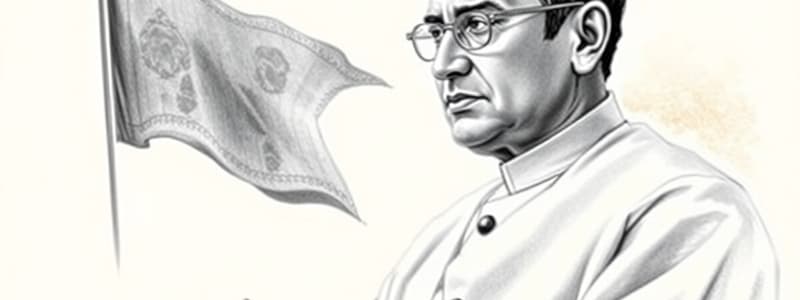Podcast
Questions and Answers
What was the primary challenge that independent India faced after gaining independence?
What was the primary challenge that independent India faced after gaining independence?
- Establishing trade relations
- Expanding its territories
- Creating a monarchy
- Nation Building (correct)
Jawaharlal Nehru delivered the 'Tryst with Destiny' speech in the morning of August 14, 1947.
Jawaharlal Nehru delivered the 'Tryst with Destiny' speech in the morning of August 14, 1947.
False (B)
Who was known as the 'Frontier Gandhi' and opposed the two-nation theory?
Who was known as the 'Frontier Gandhi' and opposed the two-nation theory?
Khan Abdul Gaffar Khan
The Muslim League used the _______ theory to argue for a separate Muslim state.
The Muslim League used the _______ theory to argue for a separate Muslim state.
Match the challenges faced by independent India with their descriptions:
Match the challenges faced by independent India with their descriptions:
Which organization opposed the Two-Nation Theory put forward by the Muslim League?
Which organization opposed the Two-Nation Theory put forward by the Muslim League?
The partition of India was smooth and painless.
The partition of India was smooth and painless.
What were the two territories created by the partition of India?
What were the two territories created by the partition of India?
Who became the first Communist leader in the world to come to power through elections?
Who became the first Communist leader in the world to come to power through elections?
The Congress party successfully maintained power in Kerala after the 1957 elections.
The Congress party successfully maintained power in Kerala after the 1957 elections.
What was the main ideological stance of the Congress Socialist Party?
What was the main ideological stance of the Congress Socialist Party?
The armed struggle in the __________ region negatively affected the image of the Communist Party.
The armed struggle in the __________ region negatively affected the image of the Communist Party.
Match the following leaders with their associated parties:
Match the following leaders with their associated parties:
What was the main reason for the Congress party's support of socialist ideas after 1955?
What was the main reason for the Congress party's support of socialist ideas after 1955?
The presence of opposition parties has helped strengthen democracy in India.
The presence of opposition parties has helped strengthen democracy in India.
What action did the central Congress Government take against the Communist Government?
What action did the central Congress Government take against the Communist Government?
Who signed the Simla Agreement on July 3, 1972?
Who signed the Simla Agreement on July 3, 1972?
Bangladesh became an independent nation in January 1972.
Bangladesh became an independent nation in January 1972.
What was the code name of India's first nuclear test conducted on May 18, 1974?
What was the code name of India's first nuclear test conducted on May 18, 1974?
India's nuclear doctrine professes 'No First ____.'
India's nuclear doctrine professes 'No First ____.'
Match the following events with their years:
Match the following events with their years:
What did India refuse to sign related to nuclear arms?
What did India refuse to sign related to nuclear arms?
The Nuclear Non-proliferation Treaty (NPT) aims to promote the development of nuclear weapons.
The Nuclear Non-proliferation Treaty (NPT) aims to promote the development of nuclear weapons.
Who is considered the architect of India's foreign policy?
Who is considered the architect of India's foreign policy?
What was one of the major aims of land reforms in India?
What was one of the major aims of land reforms in India?
The Green Revolution was specifically designed to benefit small farmers across all regions of India.
The Green Revolution was specifically designed to benefit small farmers across all regions of India.
Who is known as the Father of Green Revolution in India?
Who is known as the Father of Green Revolution in India?
The White Revolution was pioneered by __________ in India.
The White Revolution was pioneered by __________ in India.
Match the following agricultural developments with their key aspects:
Match the following agricultural developments with their key aspects:
What was a criticism of the Green Revolution?
What was a criticism of the Green Revolution?
The Indian government effectively implemented an upper limit on agricultural land holdings.
The Indian government effectively implemented an upper limit on agricultural land holdings.
What was one of the key contributions of the White Revolution?
What was one of the key contributions of the White Revolution?
Who was the leader of the syndicate in the Congress party?
Who was the leader of the syndicate in the Congress party?
Indira Gandhi followed the advice of the syndicate leaders throughout her tenure.
Indira Gandhi followed the advice of the syndicate leaders throughout her tenure.
What was the privy purse?
What was the privy purse?
After the 1971 election, the Congress (R) was not a revival of the old Congress, but a _______ of the party.
After the 1971 election, the Congress (R) was not a revival of the old Congress, but a _______ of the party.
What significant change occurred in the Congress party after the 1971 election?
What significant change occurred in the Congress party after the 1971 election?
The privy purse was abolished through the 26th Constitutional amendment in 1971.
The privy purse was abolished through the 26th Constitutional amendment in 1971.
Which party came to be known as Congress (O)?
Which party came to be known as Congress (O)?
Match the following leaders with their roles in the Congress party syndicate:
Match the following leaders with their roles in the Congress party syndicate:
Flashcards are hidden until you start studying
Study Notes
Challenges of Nation Building
- Jawaharlal Nehru delivered the "Tryst with Destiny" speech on August 14, 1947, urging dedication to nation service.
- Independent India faced significant challenges in nation-building due to its vast size and high population.
- Key challenges included:
- Nation Building: Creating a cohesive nation post-independence.
- Establishment of Democracy: Drafting the Constitution and promoting democratic practices.
- Social and Economic Development: Implementing welfare programs to combat poverty and promote equality.
The Two-Nation Theory
- Proposed by the Muslim League, asserting that Hindus and Muslims were distinct nations.
- The Congress party opposed this theory, leading to political tensions and ultimately the creation of Pakistan.
Process of Partition
- Partition of India was complex due to varied Muslim majority regions, resulting in the bifurcation into West and East Pakistan.
- Not all Muslim-majority areas agreed with this division, with leaders like Khan Abdul Gaffar Khan opposing it.
Communist Victory in Kerala
- In March 1957, the Communist Party won Kerala’s Legislative Assembly elections, with EMS Namboodiripad as Chief Minister.
- The Congress party, losing power, initiated the "liberation struggle" against the Communist government.
- The central government dismissed this Communist government under Article 356 due to alleged law and order issues.
Opposition Parties in Early Years
- Opposition parties emerged after the first general election, helping to strengthen democracy through constructive criticism.
- The early relationship between ruling and opposition parties was generally cooperative.
The Socialist Party (SP)
- Congress Socialist Party existed within Congress from 1934 to 1948, advocating for democratic socialism.
- The party faced crises after Congress adopted socialist ideas in 1955, leading to a split and decline.
Communist Party of India
- Gained traction in India post-Russian Revolution, originally part of the Congress until 1941.
- Armed resistance in the Telangana region harmed its image and influence.
Land Reforms
- Aimed to abolish the Zamindari system, consolidate agricultural land, and secure tenant rights.
- Implementation faced challenges, as many reforms were not effectively enforced.
The Green Revolution
- Introduced to enhance food security through high-yielding seeds, fertilizers, and subsidies, primarily benefiting wealthy farmers.
- M.S. Swaminathan is known as the "Father of the Green Revolution."
- Criticism arose due to the program’s focus on developed regions and growing disparities.
The White Revolution
- Spearheaded by Varghese Kurian and Amul, it transformed India’s dairy industry, benefiting numerous farmers.
Bangladesh Liberation War
- In 1971, Indian military operations led to the surrender of around 90,000 Pakistani troops in Dhaka.
- The Simla Agreement on July 3, 1972, recognized Bangladesh's independence, with Mujibur Rahman becoming its first Prime Minister.
India's Nuclear Policy
- India's nuclear program commenced in the late 1940s under Homi J. Bhabha focused on peaceful energy generation.
- First nuclear test occurred on May 18, 1974 ("Buddha Smiles") followed by a series in 1998 ("Operation Shakti").
- India's nuclear doctrine promotes "No First Use" and aims for a nuclear-free world.
Major Objectives in Politics
- Privy Purse: Financial grants to former princely states were abolished in 1971 under the 26th Constitutional amendment.
- Post-1971 elections led to the reconstruction of the Congress party under Indira Gandhi, emphasizing her central role in leadership and shifting party dynamics.
Notable Leaders and Events
- Lal Bahadur Shastri is remembered for the slogan "Jai Jawan Jai Kisan."
- Neelam Sanjeeva Reddy was the official Congress candidate in the 1969 Presidential election.
Studying That Suits You
Use AI to generate personalized quizzes and flashcards to suit your learning preferences.





